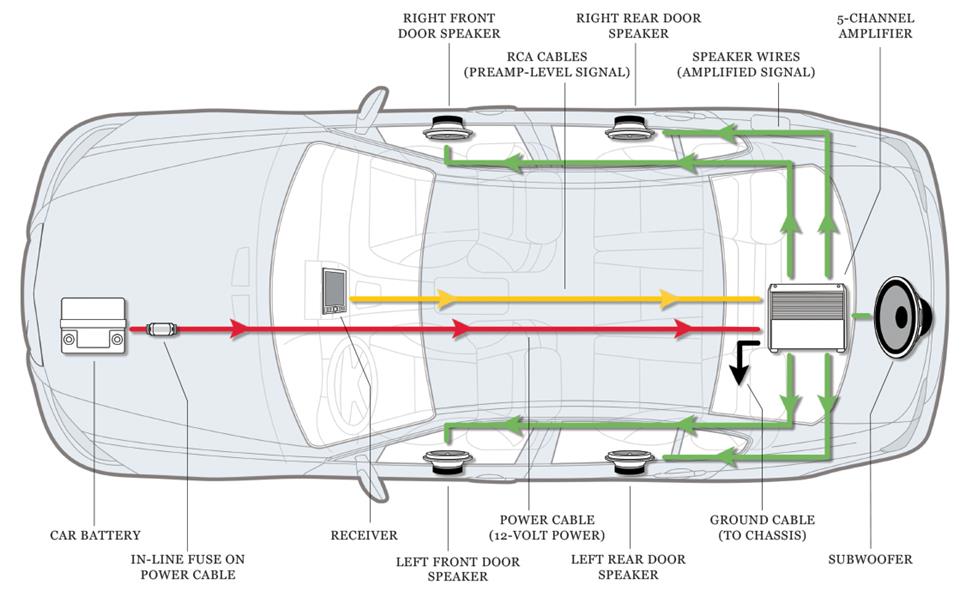Upgrade Your Ride: The Ultimate Guide to Car Audio Amplification
Ever dreamt of transforming your daily commute into a concert-like experience? Or maybe you crave that deep, resonant bass that truly brings music to life? Installing a car stereo amplifier and subwoofer can make that dream a reality. Upgrading your car audio system can seem daunting, but with a bit of guidance, it's achievable and rewarding.
Car audio amplification has come a long way. Initially, car stereos were simple AM radios. As technology advanced, so did the desire for better sound quality. Amplifiers and subwoofers entered the scene, offering richer sound and deeper bass. Today, adding these components allows for a truly customized listening experience, from crisp highs to thunderous lows.
Integrating an amp and subwoofer is crucial for anyone who values high-fidelity audio in their car. A factory-installed stereo often lacks the power to truly deliver impactful sound. An amplifier boosts the signal to your speakers, allowing them to perform at their best, while a subwoofer handles the low-frequency sounds, providing the rich bass many music lovers crave. This enhancement dramatically improves the overall listening experience.
However, setting up a car amplifier and subwoofer isn't without its potential difficulties. One common challenge is ensuring proper wiring and grounding to avoid electrical issues or unwanted noise. Correctly matching the impedance of the amplifier, subwoofer, and speakers is also critical for optimal performance and preventing damage to the components. Finally, finding the right placement for the subwoofer within the car can significantly impact the sound quality.
Before we dive into the installation process, let's clarify some terms. An amplifier takes the audio signal from your head unit and boosts its power, resulting in a louder and clearer sound. A subwoofer is a specialized speaker designed to reproduce low-frequency sounds, producing that deep, resonant bass. Impedance refers to the resistance a speaker offers to the electrical signal, measured in ohms. Matching impedance is essential for efficient power transfer and preventing damage.
Benefit 1: Enhanced Sound Quality: Amplification provides a cleaner, more powerful sound, allowing you to hear nuances in your music that were previously inaudible. Example: The subtle details in a string quartet or the powerful punch of a drum solo will become more noticeable.
Benefit 2: Increased Volume: An amplifier provides the power needed to drive your speakers louder without distortion. Example: Enjoying your favorite tunes at higher volumes without compromising the clarity of the sound.
Benefit 3: Deeper Bass: A subwoofer adds depth and richness to the low-end frequencies, enhancing the overall listening experience. Example: Feeling the rumble of a bass line in your chest.
Step-by-step installation of car stereo amplifier and subwoofer: Planning is key! Disconnect the car battery's negative terminal. Run power cables from the battery to the amplifier, using a fuse near the battery. Connect the amplifier to the head unit using RCA cables. Connect the subwoofer to the amplifier. Ground the amplifier to a clean metal surface on the car chassis. Reconnect the battery and test the system.
Checklist: Amplifier, Subwoofer, Wiring kit (power cables, RCA cables, speaker wire), Fuse, Grounding wire, Connectors, Tools (screwdrivers, wire strippers, crimpers).
Advantages and Disadvantages of Installing a Car Stereo Amplifier and Subwoofer
| Advantages | Disadvantages |
|---|---|
| Improved sound quality | Cost of equipment and installation |
| Increased volume | Space requirements for amplifier and subwoofer |
| Enhanced bass response | Potential for increased power consumption |
Best Practices: 1. Choose high-quality components. 2. Use the correct gauge wiring. 3. Securely ground the amplifier. 4. Properly set the gain controls on the amplifier. 5. Choose the right enclosure for your subwoofer.
FAQ 1: Do I need an amplifier for a subwoofer? Yes. 2: Can I install an amplifier and subwoofer myself? Yes, if you have basic car audio knowledge. 3: How much does it cost? Varies depending on the components. 4: What size subwoofer should I get? Depends on your car and music preferences. 5: How do I troubleshoot my system? Check wiring, grounding, and component compatibility. 6. What gauge wire do I need? Depends on the amplifier's power rating. 7. Where should I install the amplifier? In the trunk or under a seat are common locations. 8. How do I set the gain on my amplifier? Consult the amplifier's manual.
Tips and Tricks: Use a multimeter to test connections. Secure wiring with zip ties to prevent rattling. Consider sound deadening material to reduce vibrations.
Boosting your car's audio system by setting up an amplifier and subwoofer is a game-changer for music enthusiasts. From crisp highs to booming lows, the enhancement in sound quality elevates the entire driving experience. While the installation might seem a little challenging, following a step-by-step guide and keeping best practices in mind makes it a manageable project. Overcoming these challenges unveils the true potential of your car audio, transforming everyday drives into personal concerts. Investing in quality components and dedicating time to the process will undoubtedly lead to a richer, more immersive listening experience for years to come. So, turn up the volume and enjoy the ride!
Unlocking creativity the allure of anime boy cute drawing
Elevating your outdoor sanctuary the art of gas bottle storage
Double the fun the ultimate guide to matching profile pictures











